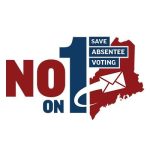We track local, state, and national news coverage and editorials about issues important to the tribes in Maine. Find excerpts from 2021 media coverage below. For more news from the Wabanaki Alliance, visit Latest News on our homepage, our Archive, or follow us on Facebook and Instagram.

Maine Voices: Mills should stress action, not words, in committing to tribal sovereignty
This guest editorial by Shirley Hager and James McCarthy explains how Gov. Mills’ latest Indigenous Peoples’ Day message highlighted incremental fixes that don’t effect systemic change.
November 24, 2021
“We need action – not self-congratulatory words or feel-good references to Maine’s ‘first stewards’ that completely gloss over the many ways our state continues to keep the Wabanaki people under its thumb as if they were no more than municipalities. Passing L.D. 1626 would be the best way to fulfill the governor’s pledge to ‘recommit ourselves to our shared home and future with respect and trust for one another.’”

Find links to other news coverage of the Indigenous Peoples’ Day Rally for Wabanaki Rights at the bottom of this post.
Maine tribal leaders say Indigenous Peoples’ Day is call to action, reform
October 11, 2021
AUGUSTA — As Maine celebrated Indigenous Peoples’ Day for a third time Monday, tribal leaders called for deeper reforms to restore the rights of Maine’s tribes and help indigenous communities.
Penobscot Nation Tribal Ambassador Maulian Dana said the change from Columbus Day to Indigenous Peoples’ Day remains a cause for celebration. But she and other leaders also said it is time for meaningful changes that would give tribes more independence under Maine law.

Our View: Indigenous Peoples Day is a time to look back and ahead
Bangor Daily News Editorial Board
October 11, 2021
“Symbolic action, however, cannot be the only action. It’s time for meaningful reform to parts of the 1980 land claim settlement that, while ending a significant amount of uncertainty at the time about ownership of two-thirds of the land in the state of Maine, also set the stage for decades of friction. It is in the state and the tribes’ best interest to rebalance this relationship as one of cooperative, self-governing partners. It’s also the right thing to do.”

More work remains as we celebrate Indigenous Peoples’ Day
The history of tribal/state relations affects how people live today and points to what we should do next.
October 11, 2021
From this editorial from the Portland Press Herald Editorial Board:
“Bills have come before the Legislature to put the tribes in Maine on the same footing as federally recognized tribes in other states, but one was tabled and the other, which would have allowed tribes to regulate gambling on Indian land, was vetoed by Gov. Janet Mills.
At the time, Mills pledged to work with the tribes to overcome her technical objections and address these historical inequities. We urge the administration to continue that work and develop bills that will make a real difference in the lives of tribal people in Maine.”

Without self-government, Indigenous Peoples’ Day does not honor Maine’s Wabanaki tribes
October 8, 2021
In this guest editorial, Chief Clarissa Sabattis of the Houlton Band of Maliseets and Chief Kirk Francis of the Penobscot Nation share why passing LD 1626 is the only way to truly honor Wabanaki tribes.
“To celebrate Indigenous Peoples’ Day you first must appreciate and respect Indigenous people. You must understand the importance of the inherent sovereignty that is the backbone of our heritage and culture. You must trust us to self-govern. The only true way to celebrate Indigenous people in Maine is to change the system that treats us differently than every other tribe in the country.”

It’s time to correct legal inequities harming Maine’s tribes
September 24, 2021
In this guest editorial, former Maine Attorney General and state Senator Michael Carpenter–who supported the Settlements Acts in 1980–explains why he now backs efforts to change them.
“Nothing in life is set in stone. I no longer embrace views I held strongly more than 40 years ago on any number of issues, including how the government-to-government relationship between the tribes and state should be understood and practiced. I’m hopeful LD 1626 , the bill that encompasses the task force’s recommendations will finally be approved by the Legislature and signed into law by Gov. Janet Mills in 2022. LD 1626 provides us the opportunity to right a wrong and restore the full rights of self-determination to the tribes in Maine that are enjoyed by 570 federal tribes across the nation in 49 states.”

The Quest For Clean Water On Maine Reservation
August 31, 2021
For decades, members of the Passamaquoddy Tribe have issued a message to family and visitors to their reservation at Pleasant Point in the state of Maine: Don’t drink the water. Residents there have long complained about its color, smell and tests reporting excess levels of contaminants. Recent efforts to improve the water treatment system have some members hopeful that a fix could be on its way. But as Maine Public Radio’s Robbie Feinberg reports, tribal leaders see the solution as a matter of tribal sovereignty.

Wabanaki tribes, community rally in Maine to support tribal sovereignty
Tribal leaders are advocating for the same rights as federally recognized tribes.
August 2, 2021
BANGOR, Maine — Members of Maine’s Wabanaki Tribes gathered Sunday at the Bangor Waterfront for a solidarity rally. They used it as an opportunity to engage with the community and educate people on their push for tribal sovereignty.
“What the Penobscot Nation and with our allies are really trying to accomplish here is a cleaner water system. One that respects the culture and heritage of the Penobscot people,’ said Penobscot Nation Chief Kirk Francis.”

Mining CEO defends comments that Maine tribes lack rights
July 20, 2021
PATTEN, Maine (AP) — The head of a Canadian mining company has defended comments in which he touted the state of Maine as a good place to do business because of a lack of rights for tribal groups. Wolfden Resources wants to develop a precious minerals mine in rural Maine. The chief executive officer of the company, Ron Little, has faced criticism recently because of comments he made during a 2019 presentation to investors in which he said there are “no indigenous rights in the state of Maine” and that “streamlines the permitting process.”
The Natural Resources Council of Maine, which opposes the mining project, shared the videos with Maine tribes, the Bangor Daily News reported. Penobscot Nation Chief Kirk Francis has described the statement as “obviously not an accurate comment.”

Gov. Mills vetoes bill to provide gaming rights to Maine tribes
Leaders of the 4 tribes reacted harshly to the veto, which was issued just hours before the measure would have become law without the governor’s signature.
June 30, 2021
AUGUSTA — Gov. Janet Mills vetoed a bill Wednesday that would have allowed Native American tribes in Maine to open casinos or other gambling businesses on their tribal lands. The bill, approved by the Legislature in June, would have ended years of state government opposition to allowing tribes in Maine to open casinos as a means of economic development.
In a lengthy, four-page veto message, Mills detailed her efforts to repair the state’s frayed relationship with the Wabanaki, whose tribes include the Maliseet, the Micmac, the Passamaquoddy and the Penobscot. But Mills said the bill, which would have restored federal gaming rights that were stripped from the tribes in a 1980 law that settled a land dispute between the tribes and the state, was fraught with problems.
Leaders from the four tribes reacted harshly to the veto in a prepared statement issued shortly after the Mills administration released the veto message.





